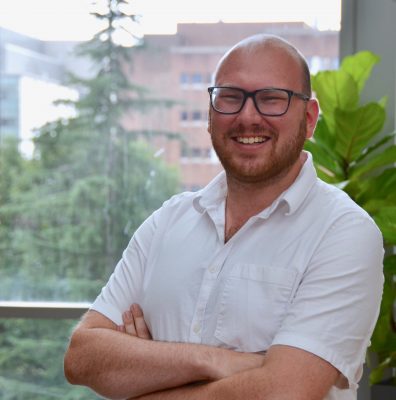Q&A with Noah Kittner, PhD
Will you tell us more about your roles at Gillings and the UNC Department of City and Regional Planning?
I am one of six faculty hired as part of the Environment, Ecology, and Energy Program at UNC, an interdisciplinary program for environmental undergraduate and graduate education. My primary home is in Environmental Sciences and Engineering and I am affiliated with City and Regional Planning – my courses on Sustainable Energy Systems are cross-listed in each department.
What does your current global health work look like?
I am quantifying the public health impacts of energy projects in different regions around the world and the benefits of an aggressive transition to utilizing renewable energy. For instance, in Kosovo we have measured trace metal content in coal leading to a study that found major health benefits for using higher shares of renewable energy and potentially gas to phase-out coal power. We are also studying the benefits of rooftop solar deployment, long-duration energy storage technologies, and renewable hydrogen production to realize climate, air pollution, and health benefits in different locations around the world – from Southeast Asian countries, such as Thailand, Myanmar, and Vietnam, to hydrogen production in Germany and storage technologies here in the United States.
Your upcoming publication evaluates the global equity impacts of installing solar photovoltaics. Will you tell us more about the importance of equity in your field?
Equity is an essential part of a sustainable energy system. Outdated and highly-polluting energy infrastructure across the world is impacting vulnerable communities in outsized ways and causing many challenges to low-income and historically marginalized communities and nations. For rooftop solar, part of the challenge is to develop more equitable access to solar, where communities of color have not had the same access to loans and initial capital investment as wealthier and whiter communities. Another policy challenge is related to ensuring fair and equitable rates that support lower-income customers. There is a concern among low-income individuals in some countries that if too many customers installed rooftop solar, the electric bills for everyone could rise because the larger, centralized utility lost those solar customers and utilities could raise rates. So it’s not enough to simply have low-carbon energy technologies, but policy makers need to ensure that countries have the ability to reduce pollution without the most vulnerable and lowest-income customers footing the bill.
What do you see as the future of global health?
Global health increasingly will incorporate human, planetary, ecological, climate, and equity considerations. Bringing together a diverse range of perspectives will help address cross-cutting challenges that require new innovations. It will take an interdisciplinary toolkit to find solutions.
What advice do you have for students just entering the field of global health?
Talk to a diverse range of faculty and practitioners who work in research areas of interest to you. Be persistent, as you never know who will be listening and what opportunities may arise.
Who is your favorite fictional character and why?
Yoda, since he teaches us to learn from our mistakes and pass on what we have learned to others.

